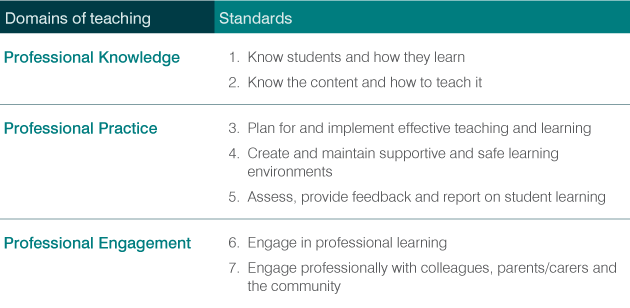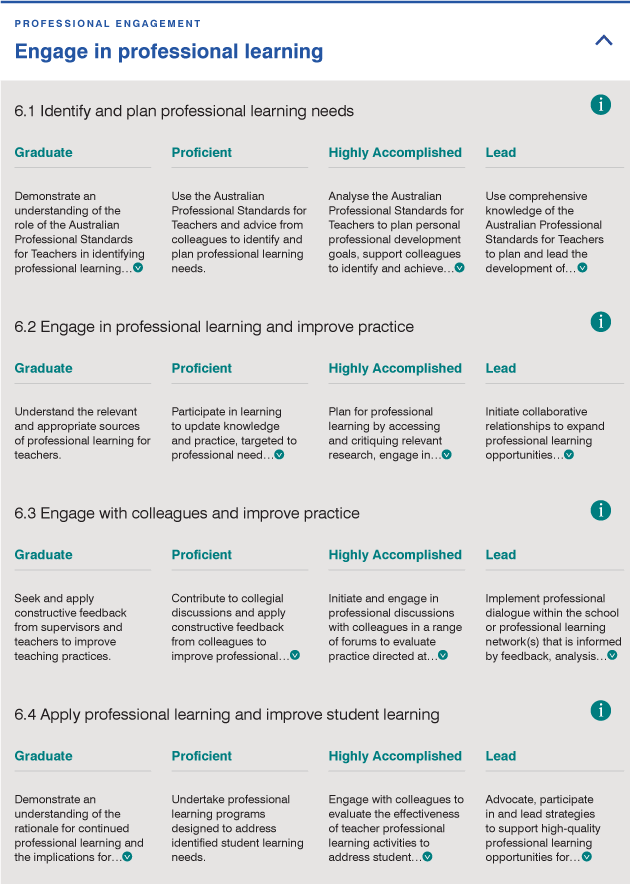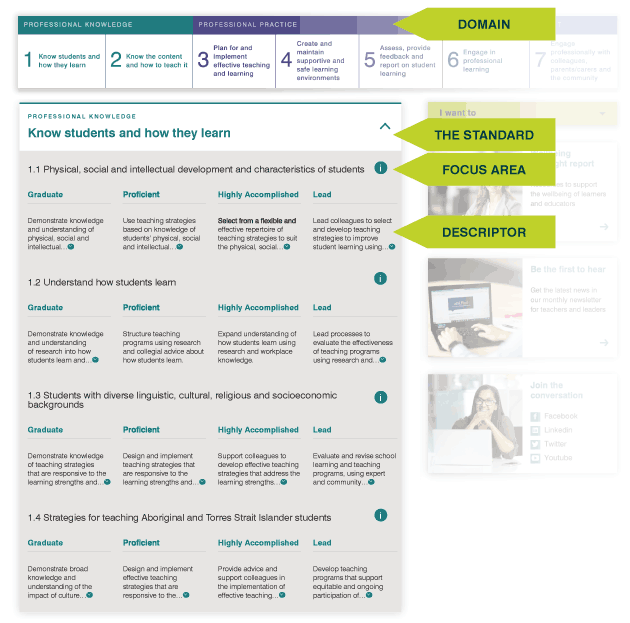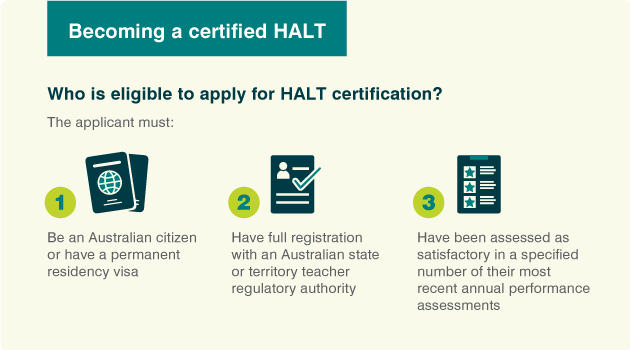The Standards are interconnected, interdependent and overlapping. There are seven standards across three domains of teaching, all with focus areas underneath. There are specific standards and focus areas for four career stages.
In this module we will look at the three domains, then the standards and focus areas, followed by the four career stages.
The Standards can be broadly grouped under three domains of teaching. This is what the Standards policy says about each domain:
“Teachers draw on a body of professional knowledge and research to respond to the needs of their students within their educational contexts.
“Teachers know their students well, including their diverse linguistic, cultural and religious backgrounds. They know how the experiences that students bring to their classroom affect their continued learning. They know how to structure their lessons
to meet the physical, social and intellectual development and characteristics of their students.
“Teachers know the content of their subjects and curriculum. They know and understand the fundamental concepts, structure and enquiry processes relevant to programs they teach. Teachers understand what constitutes effective, developmentally appropriate
strategies in their learning and teaching programs and use this knowledge to make the content meaningful to students.
“Through their teaching practice, teachers develop students' literacy and numeracy within their subject areas. They are also able to use Information and Communication Technology to contextualise and expand their students' modes and breadth of learning.”
“Teachers are able to make learning engaging and valued. They are able to create and maintain safe, inclusive and challenging learning environments and implement fair and equitable behaviour management plans. They use sophisticated communication
techniques.
“Teachers have a repertoire of effective teaching strategies and use them to implement well-designed teaching programs and lessons. They regularly evaluate all aspects of their teaching practice to ensure they are meeting the learning needs
of their students. They interpret and use student assessment data to diagnose barriers to learning and to challenge students to improve their performance.
“They operate effectively at all stages of the teaching and learning cycle, including planning for learning and assessment, developing learning programs, teaching, assessing, providing feedback on student learning and reporting to parents/carers.”
“Teachers model effective learning. They identify their own learning needs and analyse, evaluate and expand their professional learning, both collegially and individually.
“Teachers demonstrate respect and professionalism in all their interactions with students, colleagues, parents/carers and the community. They are sensitive to the needs of parents/carers and can communicate effectively with them about their
children's learning.
“Teachers value opportunities to engage with their school communities within and beyond the classroom to enrich the educational context for students. They understand the links between school, home and community in the social and intellectual
development of their students.”
The three domains of teaching are divided into seven Standards, as illustrated below.

Each of the seven Standards is further divided into focus areas, which specify particular aspects of professional knowledge, practice and engagement. Collectively, this creates a differentiated four-stage career continuum for teachers.
An example is below. Standard 6 is ‘Engage in professional learning’, with four focus areas, labelled 6.1, 6.2, 6.3 and 6.4. Each focus area has a different descriptor as you move through the career stages.


Activity
Download and print the jigsaw activity to get familiar with the structure and components of the Standards.
To complete the activity, you need to look at each descriptor and accurately place it in the right square. You can complete this on your own or with a colleague.
The jigsaw activity will help you become more familiar with the Standards and understand how they work as a career continuum.
Graduate | Proficient | Highly Accomplished | Lead |
|---|
Graduate teachers have completed a qualification that meets the requirements of a nationally accredited program of initial teacher education. | Proficient teachers have met the requirements for full registration through demonstrating achievement of the seven Standards at this level. | Highly Accomplished teachers are highly effective and skilled classroom practitioners, and routinely work independently and collaboratively to improve their practice and the practice of colleagues. | Lead teachers are recognised and respected by colleagues, parents/carers and community members as exemplary teachers. |
The Graduate career stage underpins the Accreditation of initial teacher education programs in Australia: Standards and procedures (AITSL 2011a). All initial teacher education courses across Australia must ensure that graduates meet the Graduate career stage of the Standards. Graduates from nationally accredited programs qualify for provisional registration in each state
and territory.
Teachers at the graduate career stage demonstrate knowledge and understanding of the implications for learning of students' physical, cultural, social, linguistic and intellectual characteristics. They understand principles of inclusion and strategies
for differentiating teaching to meet the specific learning needs of students across the full range of abilities.
Graduate teachers have an understanding of their subject/s, curriculum content and teaching strategies. They are able to design lessons that meet the requirements of curriculum, assessment and reporting. They demonstrate the capacity to interpret
student assessment data to evaluate student learning and modify teaching practice. They know how to select and apply timely and appropriate types of feedback to improve students' learning. Graduate teachers demonstrate knowledge of practical
strategies for creating rapport with students and managing student behaviour. They know how to support students' wellbeing and safety, working within school and system curriculum and legislative requirements.
They understand the importance of working ethically, collaborating with colleagues, external professional and community representatives, and contributing to the life of the school. Teachers understand strategies for working effectively, sensitively
and confidentially with parents/carers and recognise their role in their children's education.
The Proficient career stage underpins Nationally consistent registration for all teachers in Australia.
In order to obtain full registration as a teacher in your state/territory, you must demonstrate practice at the level of the Proficient career stage. Many teachers will also use the Standards at the Proficient career stage to reflect on their
progress when undertaking annual performance reviews.
Proficient teachers can create effective teaching and learning experiences for students. You know the unique backgrounds of students and adjust your teaching to meet their individual needs and diverse cultural, social and linguistic characteristics.
You develop safe, positive and productive learning environments where all students are encouraged to participate.
You design and implement engaging teaching programs that meet curriculum, assessment and reporting requirements. You use feedback and assessment to analyse and support your students' knowledge and understanding. You use a range of sources, including
student results, to evaluate your teaching and to adjust your programs to better meet student needs.
You are an active participant in your profession and, with advice from colleagues, identify, plan and evaluate your own professional learning needs.
You are also a team member. You work collaboratively with colleagues, and seek out and are responsive to advice about educational issues affecting their teaching practice. You communicate effectively with your students, colleagues, parents/carers
and community members. You behave professionally and ethically in all forums.
The Highly Accomplished and Lead Standards provide the basis for Certification of Highly Accomplished and Lead teachers in Australia, which recognises and promotes demonstration of a high level of quality teaching, provides an opportunity for
teachers to critically reflect on their practice, and provides a reliable indication of quality teaching that can be used to identify, recognise and reward. Certification enables teachers to receive feedback on their practice from trained
assessors who are external to their school.

Highly Accomplished
You contribute to your colleagues' learning and may also take on roles that guide, advise or lead others, including colleagues and pre-service teachers.
You maximise learning opportunities for your students by understanding their backgrounds and diverse individual characteristics and the impact of those factors on their learning.
You have in-depth knowledge of your subjects and curriculum content. You work with colleagues to plan, evaluate and modify teaching programs to improve student learning and keep abreast of the latest developments in your specialist content area
or across a range of content areas for generalist teachers.
Your interpersonal and presentation skills are highly developed and you communicate effectively and respectfully with students, colleagues, parents/carers and community members.
Lead
They have demonstrated consistent and innovative teaching practice over time. Inside and outside the school, they initiate and lead activities that focus on improving educational opportunities for all students. They establish inclusive learning
environments, meeting the needs of students from different linguistic, cultural, religious and socio-economic backgrounds. They continue to seek ways to improve their own practice and to share their experience with colleagues.
They are skilled in mentoring teachers and pre-service teachers, using activities that develop knowledge, practice and professional engagement in others. They promote creative, innovative thinking among colleagues.
They apply skills and in-depth knowledge and understanding to deliver effective lessons and learning opportunities and share this information with colleagues and pre-service teachers. They describe the relationship between highly effective teaching
and learning in ways that inspire colleagues to improve their own professional practice.
They lead processes to improve student performance by evaluating and revising programs, analysing student assessment data and taking account of feedback from parents/carers. This is combined with a synthesis of current research on effective teaching
and learning.
They represent the school and the teaching profession in the community. They are professional, ethical and respected individuals within and outside the school.

Activity
Use the Teacher Self-Assessment Tool to see where you would locate your practice within the Standards.
Certification
Certification of Highly Accomplished and Lead Teachers in Australia is a nationally recognised achievement against the two voluntary levels of the Standards.
The Australian Professional Standards for Teachers
Teacher career stages
Continue your study on the Standards with the next module
Alternatively, return to the